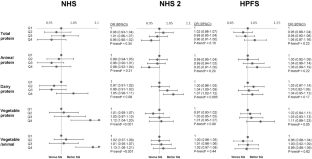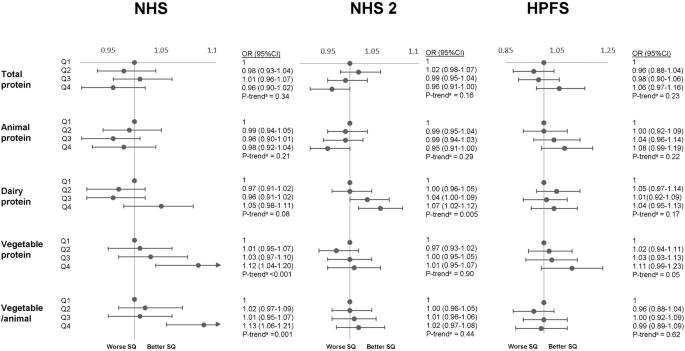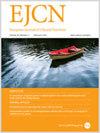蛋白质摄入量及其与睡眠质量的关系:3 项前瞻性队列研究的结果。
IF 3.6
3区 医学
Q2 NUTRITION & DIETETICS
引用次数: 0
摘要
背景/目的:睡眠质量是影响日间功能和慢性疾病风险的关键因素。我们调查了美国三个队列中总蛋白质和蛋白质亚型的摄入量与睡眠质量之间的关系:在 "护士健康研究"(NHS)、"护士健康研究2"(NHS2)和 "健康专业人员随访研究"(HPFS)中,每4年使用有效的食物频率问卷评估一次饮食摄入量。睡眠质量用匹兹堡睡眠质量指数或改编版测量一次。根据前两次膳食调查问卷的平均值,采用序数逻辑回归法计算出几率比(OR)和 95% 的置信区间(CI),以估计睡眠质量较好与睡眠质量较差的几率,具体取决于蛋白质摄入量(能量百分比):在 32,212 名来自 NHS 的女性、51,126 名来自 NHS2 的女性和 14,796 名来自 HPFS 的男性中,总蛋白质摄入量与睡眠质量无关。然而,从植物中摄取的蛋白质与睡眠质量没有关系或呈正相关(NHS 中四分位数 4 与四分位数 1 的 OR 值:1.12,1.04-1.20,P-趋势 结论:我们的研究结果表明,与动物性蛋白质来源相比,植物作为蛋白质来源可能与更好的睡眠质量有关。为了验证我们的研究结果,有必要开展进一步的研究。本文章由计算机程序翻译,如有差异,请以英文原文为准。


Protein intake and its association with sleep quality: results from 3 prospective cohort studies
Sleep quality is a critical factor for daytime functioning and chronic disease risk. We investigated the association between intakes of total protein and protein subtypes and sleep quality in three U.S. cohorts. In the Nurses’ Health Study (NHS), NHS2, and Health Professionals Follow-up study (HPFS), dietary intake was assessed every 4 years using validated food frequency questionnaires. Sleep quality was measured once with the Pittsburgh Sleep Quality Index or adapted versions. With ordinal logistic regression, odds ratios (OR) and 95% confidence intervals (CI) were calculated to estimate the odds of having better sleep quality versus poorer sleep quality depending on protein intake (%Energy) based on the average of the prior two dietary questionnaires. In 32,212 women from NHS, 51,126 women from NHS2, and 14,796 men from HPFS, total protein intake was not associated with sleep quality. However, the intake of protein from vegetable sources showed no association or a positive association with sleep quality (OR for quartile 4 versus quartile 1 in NHS: 1.12, 1.04–1.20, P-trend < 0.001; NHS2: 1.01, 0.95–1.07, P-trend = 0.90; HPFS: 1.11, 0.99–1.23, P-trend = 0.05), whereas divergent results were observed for animal protein sources. Overall, intakes of processed red meat and poultry were associated with worse sleep quality, whereas no or positive associations were observed for dairy and fish protein. Our results suggest that plants as a source of protein may be associated with better sleep quality than animal sources of protein. Further studies are warranted to validate our findings.
求助全文
通过发布文献求助,成功后即可免费获取论文全文。
去求助
来源期刊
CiteScore
10.60
自引率
2.10%
发文量
189
审稿时长
3-6 weeks
期刊介绍:
The European Journal of Clinical Nutrition (EJCN) is an international, peer-reviewed journal covering all aspects of human and clinical nutrition. The journal welcomes original research, reviews, case reports and brief communications based on clinical, metabolic and epidemiological studies that describe methodologies, mechanisms, associations and benefits of nutritional interventions for clinical disease and health promotion.
Topics of interest include but are not limited to:
Nutrition and Health (including climate and ecological aspects)
Metabolism & Metabolomics
Genomics and personalized strategies in nutrition
Nutrition during the early life cycle
Health issues and nutrition in the elderly
Phenotyping in clinical nutrition
Nutrition in acute and chronic diseases
The double burden of ''malnutrition'': Under-nutrition and Obesity
Prevention of Non Communicable Diseases (NCD)

 求助内容:
求助内容: 应助结果提醒方式:
应助结果提醒方式:


